We can all agree on how stunning a reef tank looks with its beautiful corals and interesting fish but how do you go about creating one of your own?
Well, one of the most important things to consider first is which marine salt to use.
Not all marine salts are the same. Some are better for corals than others so we’ve taken a look for you and here is our guide to the best salt for a reef tank.
Table of Contents
Top 5 Salts for a Reef Tank
| # | Preview | Product | Quick Review |
| 1 | 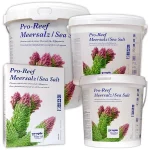 | Tropic Marin Pro-Reef Salt | Best Overall |
| 2 | 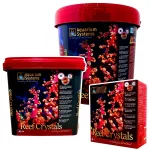 | Aquarium Systems Reef Crystals | Best Value |
| 3 | 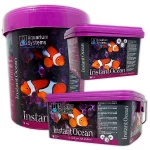 | Aquarium Systems Instant Ocean | Good for Fish-Only |
| 4 | 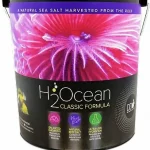 | D-D H2Ocean Marine Salt Pro | Good |
| 5 | 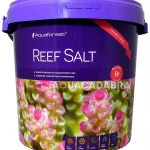 | Aquaforest Reef Salt | Decent |
Why You Should Use The Best Salt for a Reef Tank
Corals extract chemical elements and nutrients from the water around them to grow and thrive so it’s important that those elements are readily available.
The main chemical elements that corals need (along with lighting) are calcium, carbonate, and magnesium, allowing them to construct their chalk skeletons as they grow.
Of course, some corals do not have a hard skeleton; these soft corals will be fine if you use any marine salt mix.
However, if you are wanting to grow more demanding LPS and SPS corals you will need salt specifically formulated for a reef tank.
What to Look for When Buying Salt for a Reef Tank
As mentioned above, LPS and SPS corals need calcium, carbonate, and magnesium to grow their chalk skeletons so many marine salt mixes are specifically formulated to enhance those elements.
These are the marine salt mixes you should look for for a successful reef tank.
You should look at how closely the salt parameters match your tank parameters or the parameters you wish to achieve. That way subsequent water changes will not significantly change those parameters.
In addition, you should look at how easy the salt is to mix and use.
Salt for a Reef Tank Product Reviews
Here are my reviews of the best salt for a reef tank products:-
1. Tropic Marin Pro-Reef Salt
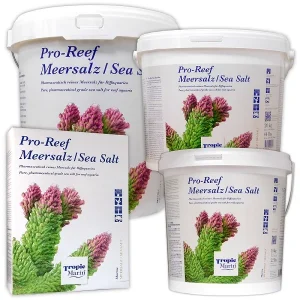
Tropic Marin Pro-Reef Salt is recognized as the premier salt mix for a reef tank.
The salt has been designed with optimized concentrations of calcium and magnesium whilst maintaining the alkalinity in a range of 7-8° dKH.
Specially designed for use with calcium reactors or mineral additives.
Parameters:-
At a salinity of 35 ppt (1.026 specific gravity)
| Alkalinty (dKH) | 7.0 |
| Calcium | 430 |
| Magnesium | 1450 |
Pros
- Excellent for SPS and LPS Corals
- High on Calcium and Magnesium
- Easy to mix
- Pharmaceutical grade
Cons
- Expensive
2. Aquarium Systems Reef Crystals
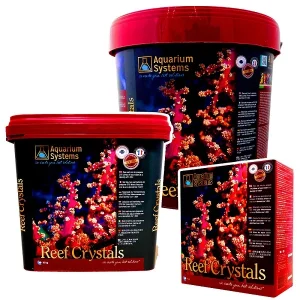
Reef Crystals, with added doses of calcium, vitamins and selected trace elements is the go-to salt for many reef keepers
The salt was the first enriched sea salt formulation available to hobbyists and includes a special additive that helps to eliminate surplus heavy metals.
Parameters:-
At a salinity of 35 ppt (1.026 specific gravity)
| Alkalinty (dKH) | 13.0 |
| Calcium | 490 |
| Magnesium | 1440 |
Pros
- Relatively Cheap
- Elevated Calcium and Magnesium
- Mixes well
Cons
- High dKH which may or, may not, suit your requirements
(Note: We found when using Reef Crystals that the Alkalinty of a freshly mixed batch was around 11.0 dKH.)
3. Aquarium Systems Instant Ocean
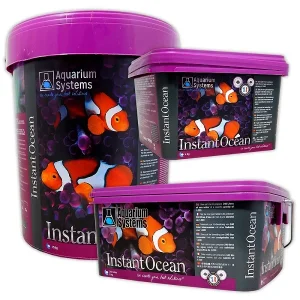
Aquarium Systems Instant Ocean is the most popular brand of salt out there and it is great for all types of marine tanks.
It’s great for beginners and is all you’ll need for a fish-only set-up or a reef tank with only soft corals.
For more demanding LPS and SPS corals, you should look for a salt with a higher calcium and magnesium content.
Parameters:-
At a salinity of 35 ppt (1.026 specific gravity)
| Alkalinty (dKH) | 9.0 |
| Calcium | 460 |
| Magnesium | 1380 |
Pros
- Inexpensive
- Great for FOWLR (fish-only) tanks.
- Easy to mix
Cons
- Calcium and Magnesium levels too low for LPS and SPS corals
4. D-D H2Ocean Marine Salt Pro
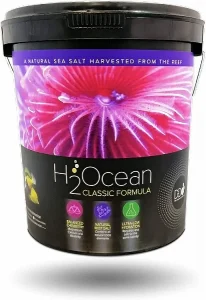
D-D H2Ocean Marine Salt Pro is made using a solar evaporative process producing a pure natural salt that is then specially enhanced for aquarium use by elevating specific elements that over time become depleted.
The enhanced levels of calcium and magnesium are then used by corals and coralline algae for growth.
Parameters:-
At a salinity of 35 ppt (1.026 specific gravity)
| Alkalinty (dKH) | 11.0 |
| Calcium | 400 |
| Magnesium | 1350 |
Pros
- Good Value
- Mixes well
Cons
- Calcium and Magnesium levels on the low side
5. Aquaforest Reef Salt
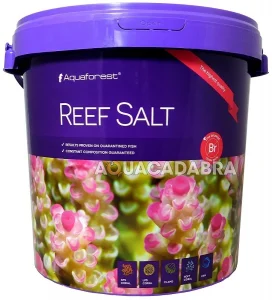
Aquaforest Reef Salt is for aquariums with more demanding SPS and LPS corals with elevated levels of calcium and magnesium relative to dKH.
It is bromide free and easy to mix.
Parameters:-
At a salinity of 35 ppt (1.026 specific gravity)
| Alkalinty (dKH) | 8.0 |
| Calcium | 450 |
| Magnesium | 1390 |
Pros
- Good for SPS and LPS Corals
- High on Calcium and Magnesium
- Easy to mix
Cons
- Expensive
Conclusion
Tropic Marin Pro-Reef Salt gets our vote as the best salt for a reef tank with more demanding LPS and SPS corals due to its elevated levels of calcium and magnesium relative to dKH.
Aquarium Systems Reef Crystals is a very close second and is great for a mixed reef tank with mainly soft corals, some LPS, and a few easy SPS corals.
Reef Crystals is definitely the best value salt for a reef tank out there.
Aquarium Systems Instant Ocean is all you’ll need for a fish-only tank or if keeping just a few easy soft corals.
Salt for a Reef Tank FAQs
Can you use tap water in a reef tank? – No. High levels of dissolved solids, phosphates and nitrates in tap water can cause huge problems in a reef tank. Trace amounts of copper and other metals can be toxic to your coral so it’s always best to use pure RO water to mix your saltwater.
What kind of salt do you put in a saltwater tank? – Well you certainly can’t just use any salt. You must use specially formulated marine or reef salt that contains trace elements and minerals to recreate the conditions found in the ocean. They also have the buffering capacity to help keep the pH in the appropriate range.
What is the difference between reef salt and marine salt? – Reef salt has elevated levels of calcium and magnesium over that found in natural seawater. These elevated levels help your corals to grow and thrive.
What is the ideal salinity for a reef tank? – The ideal salinity for a reef tank is between 1.024 – 1.0265 (specific gravity). For soft corals only, the lower end of that range is fine. For more demanding LPS and SPS corals, you should aim for the higher end of that range.
How long does reef salt mix last? – Ideally, you should thoroughly mix your salt water and add it straight to your tank as needed. With most salt mixes you should be OK if added within 24 – 48 hours. It can be stored for longer in a suitable food-grade container but some chemical elements may deplete over time.
